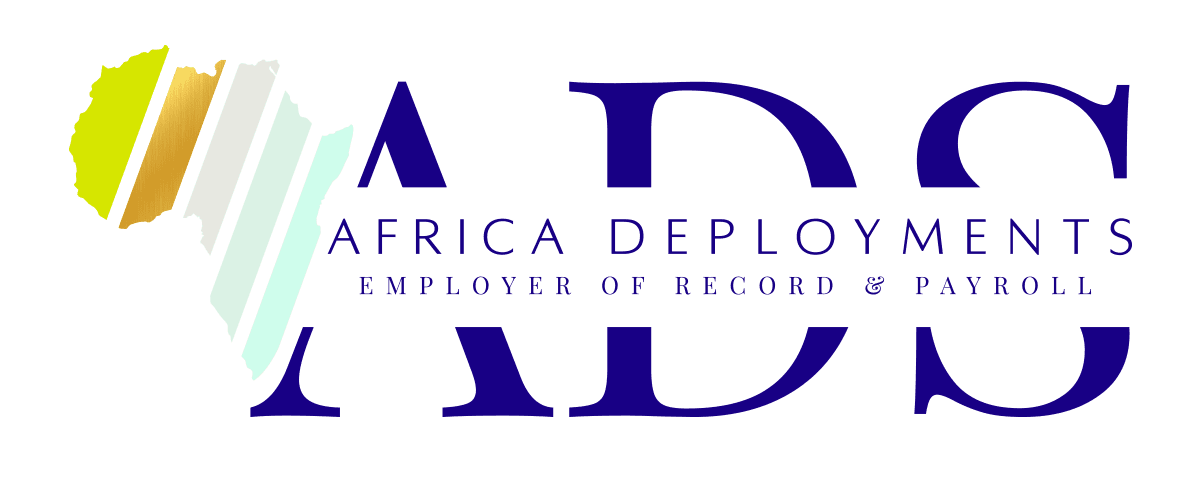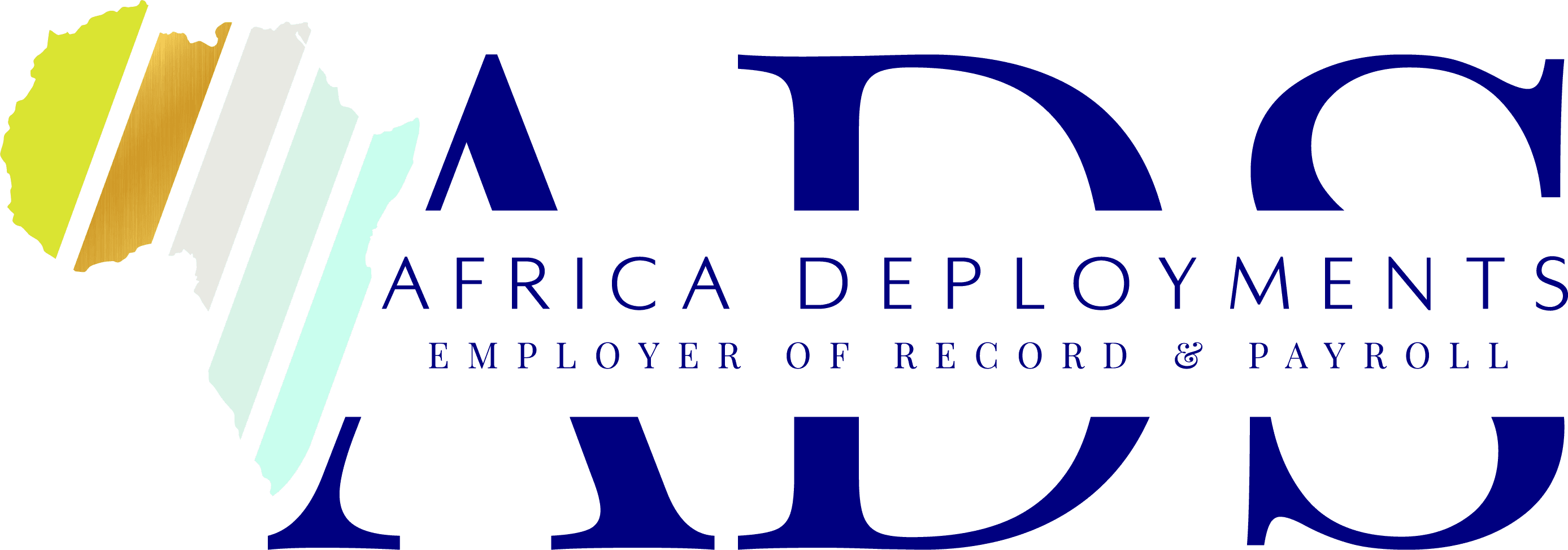Guinea Bissau Employer of Record & Payroll

Africa Deployment Guinea Bissau offers our clients Employer of Record (EOR) services covering all of the regions within. We offer full-time employment or fixed terms contracts based on your requirements in Guinea Bissau for locals or expatriates. ADS will take care of the work permit under our umbrella and will issue local work contracts to your contractors. We will also advise our client’s on best Human Resource (HR) practices when setting up the employee’s locally in Guinea Bissau .
ADS takes care of the local tax & PAYE remittances to the Revenue Services on a monthly basis ensuring that they are fully compliant with the law. We will also ensure that their salaries are paid on time monthly and issue them with their pay slips. In addition to our services, we can offer you the employee in Guinea Bissau , Medical, Disability, Life, and Workmen’s Compensation Insurances.
Guinea-Bissau is a West African country with a population ±2.1 million
Being one of the smallest countries in Africa [36,130km²], Guinea Bissau has an intricate 350km shoreline on the Atlantic Ocean, with numerous estuaries that penetrate inland.
Guinea-Bissau is rich in off-shore oil and mineral resources, including phosphates, bauxite, and mineral sands. Its economy heavily depends on agriculture and it is one of the top five cashew producers and exporters in the world.
Generally the climate is humid and the cuisine delicious – the national dish is considered to be Caldo stews, including Caldo Mancarra, a chicken and peanut stew.
Religion in Guinea-Bissau is diverse, with Islam being the most widely professed faith followed by Christianity and Traditional Faiths.
The Balanta, literally “those who resist,” represent more than ¼ of the population.
Population
2.061 million (2021)
Currency
Capital
Language
Portuguese
GDP
1.639 billion USD (2021)
Industries
Agriculture & Processing
What is the main language spoken in Guinea-Bissau:
The official language of Guinea-Bissau is Portuguese, spoken by ±11% of the population, whilst Guinea-Bissau Creole [derived mostly from Portuguese] is spoken by ±44% of the population.
Overall Guinea-Bissau is multilingual and ±20 African languages predominate.
Very few people speak English in Guinea-Bissau, especially away from the capital.
What type of employment contracts can you offer in Guinea-Bissau:
- Fixed Term
- Indefinite term
- Be in writing
- Be in the official local language and the local currency
- Include salary/compensation, benefits and termination requirements
- Have specific working terms and conditions
- Can be eligible for organizational perks and/or other benefits
- Tend to be more focused [as only one employer] and familiar with the specific business – due to e.g. ongoing company training etc.
- Probationary period is 1 – 3 months [maximum]
- Probationary period may be extended under exceptional circumstances e.g. for highly complex roles to 6 months [maximum]
WHAT INCOME IS TAXABLE IN Guinea-Bissau:
Any income earned in the form of cash, wages, salary, overtime, leave pay or payment in lieu of leave, commissions, gratuity, bonus, or any amount that has benefited the employee. All income will be taxed in accordance with the law and the final payroll issued monthly.
What income is exempt from taxes in Guinea-Bissau:
- Income from agriculture, livestock, fishing, and forestry is generally exempt from income tax.
- Scholarships, stipends, and grants for educational purposes may also be exempt.
- Consulting with a tax professional or referring to official tax resources is recommended for accurate information.
Standard working hours: Number Overtime to be paid?
In Guinea-Bissau, standard working hours are typically 40 hours per week. If an employee works beyond these hours, it is considered overtime. Employers are required to pay overtime at a rate that is at least 50% higher than the regular hourly rate.
What are the mandatory contributions of Guinea Bissau?
- Contribution Rate: The employer is responsible for contributing 7% of the employee’s gross salary to the Social Security Fund (CNaPS).
- Threshold: There may be a minimum salary threshold or income limit above which the contributions apply. However, the specific threshold amount is not available.
- Contribution Rate: The employer is required to contribute 4% of the employee’s gross salary to the National Health Insurance Fund (CNAM).
- Threshold: Similar to Social Security, there may be a minimum salary threshold or income limit, but the exact threshold amount is not provided.
- Contribution Rate: The employer must contribute 2% of the employee’s gross salary to the National Employment and Vocational Training Fund (FNEF).
What is the Maternity and Paternity policy within Guinea Bissau:
- leave be at least 60 days
- No statutory paternity leave in Guinea-Bissau
What type of leave is allowed in Guinea Bissau:
Annual leave
- 7 days, full pay for four months of continued service that can be used during the calendar year.
Sick Leave
- 5 days’ pay annually
Do I need to pay a mandatory bonus annually OR is it discretionary in Guinea Bissau:
There is no statutory requirement to pay a 13th or 14th month salary / bonus in Guinea-Bissau.
However, regular bonuses are customary for employees – but they are monthly as opposed to quarterly or attached to holidays.
What Gratuity / Severance payments do you need to provide for Guinea Bissau:
Termination:
- The notice period is 1 month for employees with less than 3 years of service.
- Otherwise the notice period equals 2 months
Severance:
- Severance pay equals 1 month of remuneration for each year of service.
CAN YOU GIVE FRINGE BENEFITS IN Guinea Bissau:
Yes you can but keep in mind that Fringe Benefits will be subject to employee PAYE tax. Only benefits that cannot be converted to cash will not be subject to tax. If the employer covers some of the employees expenses i.e. mobile phone then it must be subject to PAYE tax and either the employer will cover this portion for the employee or the employee will bear the PAYE tax.
Mandatory Probation period of Guinea Bissau:
The probation period in Guinea Bissau is determined by the employer and is mandatory for new employees.
Is 13th month pay (Bonus) mandatory?
Not mandatory, applicable as per contract.
What are the Corporate and VAT / Sales tax rates in Guinea Bissau:
Corporate Tax Rates: 25% [in general]
VAT / Sales Tax Rates: 15% [on most goods and services]
Public Holidays in Guinea Bissau:
- January 1 - New Year's Day
- January 20 - National Heroes' Day
- March 08 - International Women's Day
- April 22 - Korité
- May 01 - Labour Day
- June 29 - Tabaski
- August 03 - Pidjiguiti Day
- September 24 - Independence Day
- November 14 - Readjustment Movement Day
- December 25 - Christmas Day
What Industries we support in Guinea Bissau:
- Non-Governmental Organization’s (NGO) / Non- profit
- Engineering & Construction
- Government / Development Agencies
- Oil & Gas
- FMCG & Manufacturing
- Private Equality, Finance, Insurance & Banking
- Mining
- Agriculture
The information provided above is for an “informative decision” and may change at any given time without prior notice. We always suggest speaking to one of our Sales Consultants before engaging in country.



